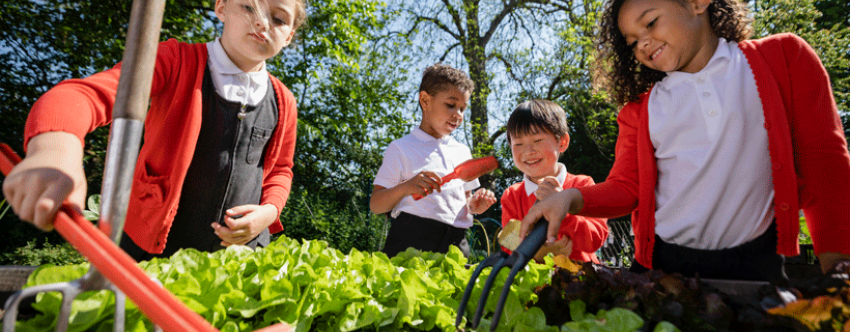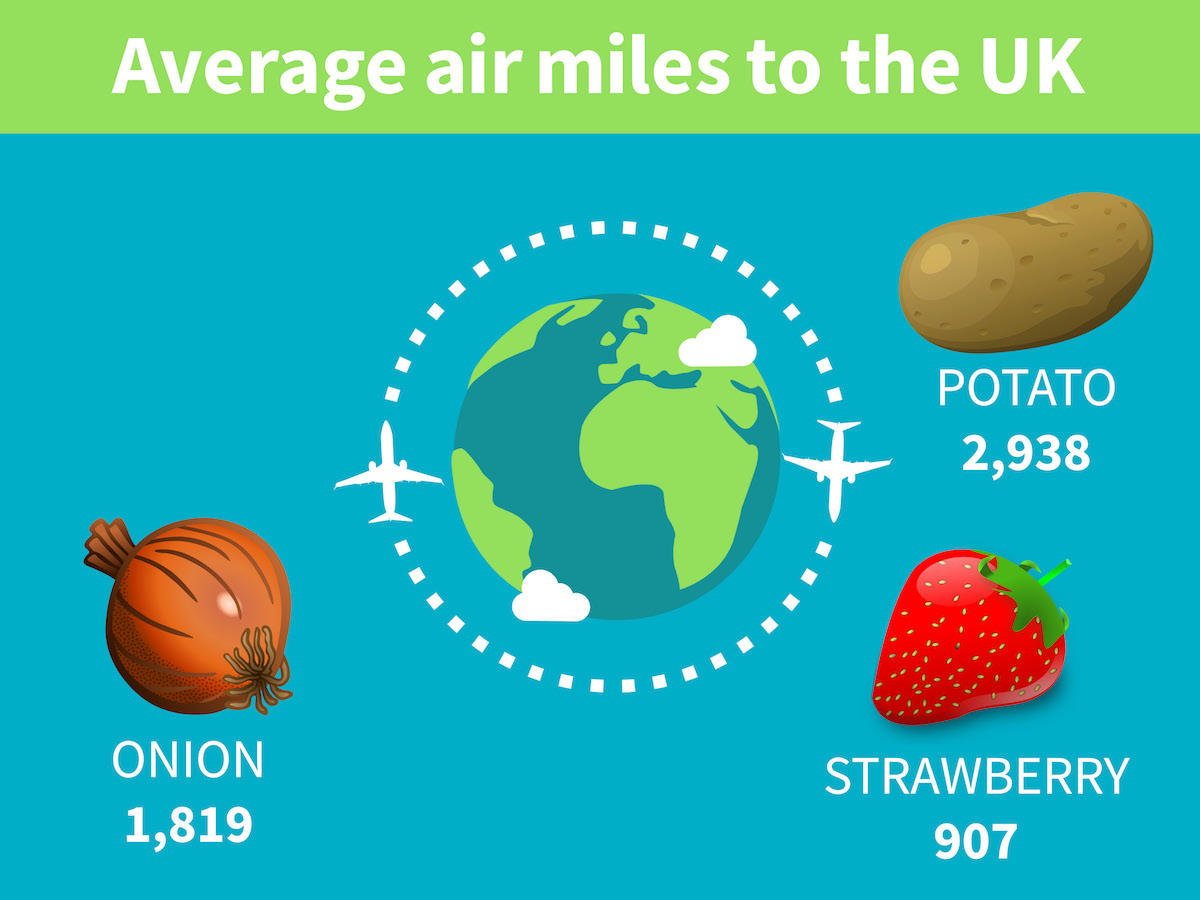News & Views

Outdoor learning: Where food comes from
As educators, we want every child to know about and be aware of local, national and global environmental issues. Positive action all schools can take is to teach learners about how they can all have an impact in supporting their school and community to become Zero Carbon.
School gardening and climate change
School gardening is one of the major actions in helping schools become Zero Carbon by the government’s target of 2030–2035. School gardening has so many benefits for our environment and also for children, including:
- teamwork
- social interaction
- health and wellbeing
- physical activity
- self-confidence.
More and more schools are encouraging their staff and pupils to get outside and enjoy growing their own food from seed. Sadly, many children still think their food just comes from the supermarket.
It is so important to teach children from an early age about the skills, processes and benefits of growing food, harvesting and then cooking it.
Food for thought
Children need to learn to grow fruit and vegetables by the seasons to teach them where their food comes from, what foods can be grown in which season and the benefits of doing this for their carbon footprint. The food grown is much tastier and healthier to eat. It travels zero air miles to get to their plates and uses less packaging and resources making it better for the environment. Time, weather and seasonal change link so well to many national curriculum objectives.
The average air miles of an onion flown to the UK is 1,819 miles, strawberries 907 miles and potatoes 2,938 miles. These fruit and vegetables can be grown in the UK by their seasons. Food Miles is a useful website for children to find out how far their food has travelled.

School gardening for all, across the school curriculum
School gardening should be encouraged across the whole school, being part of its ethos, so every child has an opportunity to get into the garden to learn these important life skills. These skills include planning what to grow where and when, digging, sowing seeds and when to know what needs harvesting.
There is a wealth of expertise, knowledge and enthusiasm in every community from retired people who might have an allotment or sadly no longer have a garden of their own but want to share these skills with the children. Rotarians and Women's Institute (WI) members are often keen to volunteer their time to support school projects too. They might even look after your school garden in the holidays to keep it progressing.
Connecting with your local garden centre is a good way to receive donations of seeds, compost and plants. Garden centres encourage younger people to their centres as they are the next generation of gardeners. Therefore, they are keen to work with schools, donating seeds, bird feed, bird boxes and split compost bags to support school projects.

School garden projects
School projects can involve children growing produce by the seasons for a local show that might include, for example, the biggest courgette or potato, making chutney and jams that could then be sold to raise funds for the school garden. You can open up a school greengrocery by selling produce that has been grown in the school garden after school or even taking the produce down to the local weekly market or monthly farmers’ market. This helps children’s communication skills, teamwork and maths (handling money, weighing, addition and giving change) and increases their confidence. The money raised can go back into the school garden. You never know who you may meet at the market who might be able to help support the school’s gardening scheme.
Growing vegetables and fruits and using them to cook a traditional British dish or a dish from around the world links to the geography and global citizenship curriculum. You can invite parent to sample the dishes the children have made, which always goes down well, as does making and sharing bread and soup. A simple recipe to start with is onion bhajis. The pupils could collate all the recipes into a school recipe book to sell to the parents.
You could invite the community into the school grounds at the weekend to look at the school garden with children giving guided tours.
All these ideas will encourage, inspire and empower children with support from their parents/carers to try growing their own produce at home – whether in a garden, allotment or on a balcony using pots or reusable containers.
Ten top tips
- Form a garden committee to lead the garden activity with a passionate member of staff, parents and volunteers.
- County and Country Gardens Trusts are independent charities that take care of gardens and designed landscapes all over England and Wales. They are members of The Gardens Trust and give funding to schools for garden projects.
- Decide where to have your garden and ask the community, businesses and parents for reusable pieces of wood to make raised bed frames. Make sure there is a water butt and compost heap nearby.
- Find a seasonal growing calendar of what can be grown and when and plan what you will grow throughout the year. It's helpful to have a floor plan for your school garden.
- Make sure that the children can harvest what is sown during the school term as some vegetables and fruits may not be ready till the holidays and the children won’t be able to harvest or taste them. Short-term crops (harvested during one term) include beetroot, carrots, cucumber, French beans, lettuce, courgettes, radishes and spinach. You can sow medium-term crops in one term and harvest them in the next – broad beans, cabbage, onions, peas, pumpkins sweetcorn, tomatoes and potatoes. Long-term crops can be sown in one term and then harvested in the next term or the following – broccoli, brussels sprouts, leeks, parsnips and potatoes.
- Connect with your local garden centre and share any garden projects in school that you need support with. Ask for any broken bags of compost that they can’t sell and can donate for free.
- Contact local rotary clubs, WIs and community garden groups, asking for volunteers to work with schoolchildren and to look after the garden during the school holidays.
- When starting, encourage each class to grow two vegetables from the short-term list so they see quick results which will inspire the children to grow more.
- Enrol your school with RHS Schools Gardening and work through the five levels. At each level, there is a reward for the school when completed. These rewards include £50 National Garden Gift Vouchers , bundles of seeds worth £100 and £200 of garden gift vouchers if you achieve Level 5.
- Sign up to Grow Your Own Potatoes which donates a free box of seed potatoes as part of a national growing competition.
Gardening not only teaches the children the joys of outdoor learning and getting close to nature but also teaches them the positive impact they can have on climate change, the environment, healthy eating and nutrition. All the skills learned in the school garden can help support the next generation to make our world better for everyone.
The Outdoor Learning Award helps pupils develop their confidence and skills through learning outside.
About the author

Edd Moore is a multi-award-winning teacher and eco-coordinator who has been at the forefront of environmental education and sustainability for the past decade.
Edd writes environmental strategies for school curriculums to help schools to achieve Zero Carbon by 2030. He mentors and supports schools, teachers and students from around the world on their environmental journey. Edd is a National Council member of the National Association for Primary Education (NAPE) as its Schools Environmental Officer.